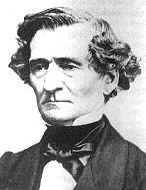

HECTOR BERLIOZ
11thDecember 1803 --- 8thMarch 1869
The above was written by Cuthbert Haddon in 1916.
Last Updated on May 2025
By Steven Ritchie
And now for the Music

(3254)"Marche Hongroise (Hungarian march)". Sequenced by Steven Ritchie.
NEW (4674)"Symphonie Fantastique, Mov.2". Sequenced by Wang Tao.
(3246)"Symphonie Fantastique, Mov.5, Ronde d'un Nuit de Sabbat". Sequencer Unknown.
(3247)"Le Corsaire". Sequenced by John Taylor.
Thanks to George Pollen for the music below.
(1109)"Symphony Harold in Italy for Viola and Orchestra 2nd Movement". Sequenced by Jason Plumlee (1110)"Symphony Harold in Italy for Viola and Orchestra 3rd Movement". Sequenced by Jason Plumlee (1112)"March to the Scaffold". Sequenced by Andrew Anderson. (3245)"Hungarian March From The Damnation of Faust". Sequencer Unknown. (1111)"Roman Carnival Overture, Opus. 9". Sequencer Unknown.

If you done any Classical pieces of say for example, Delius, mozart, and so on etc,
please email them to the classical music site with details to
"classical (@) ntlworld.com" written this way to stop spammers
just remove spaces and brackets for email address, thank you.

Visitors to this page --

Back to Classical Midi Main Menu click "HERE"